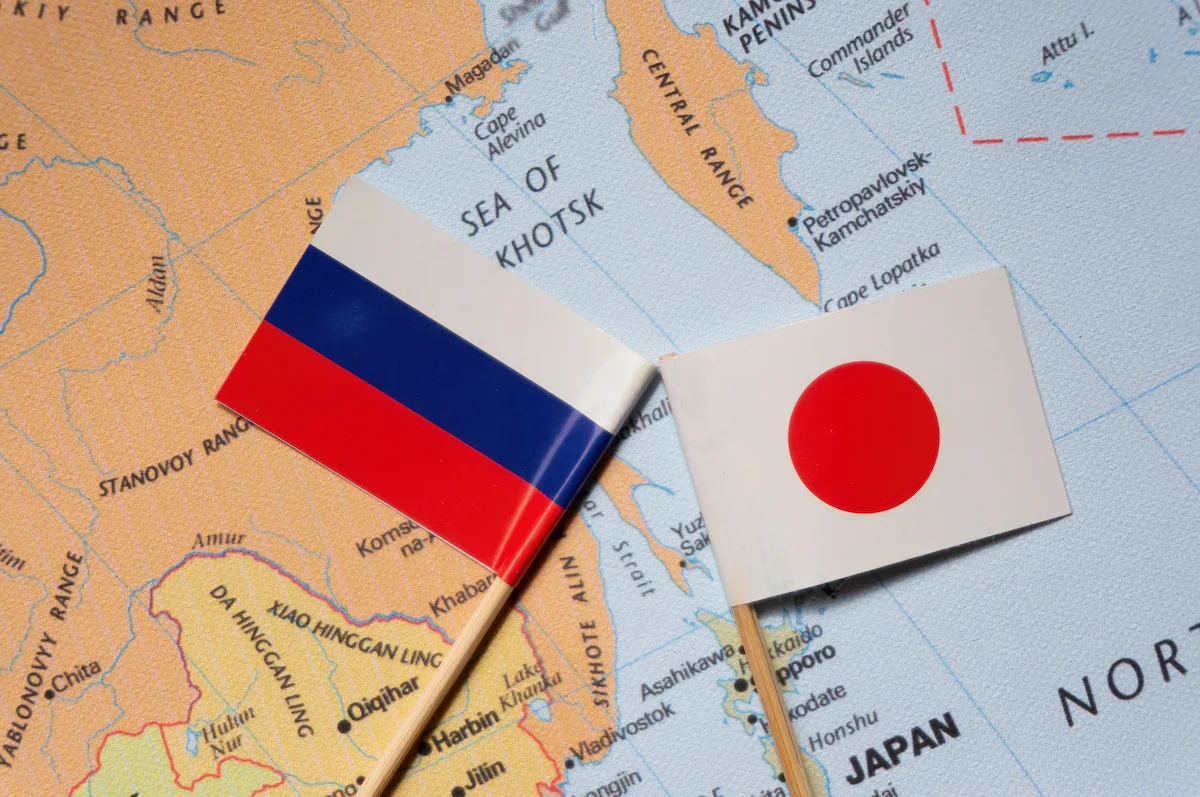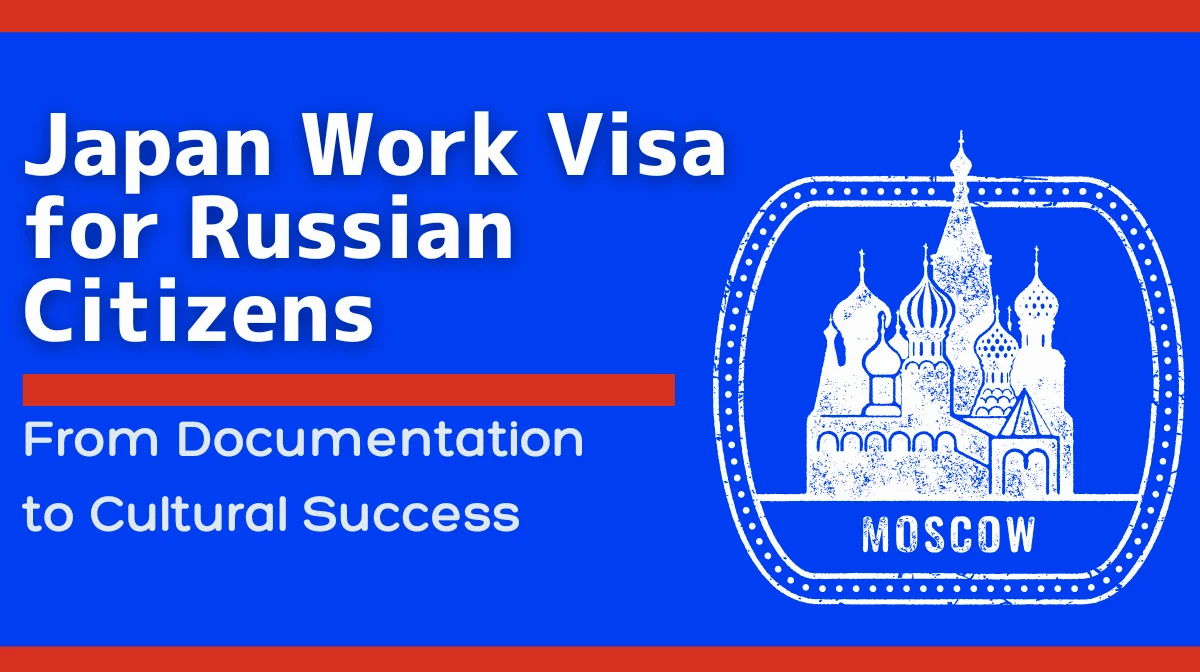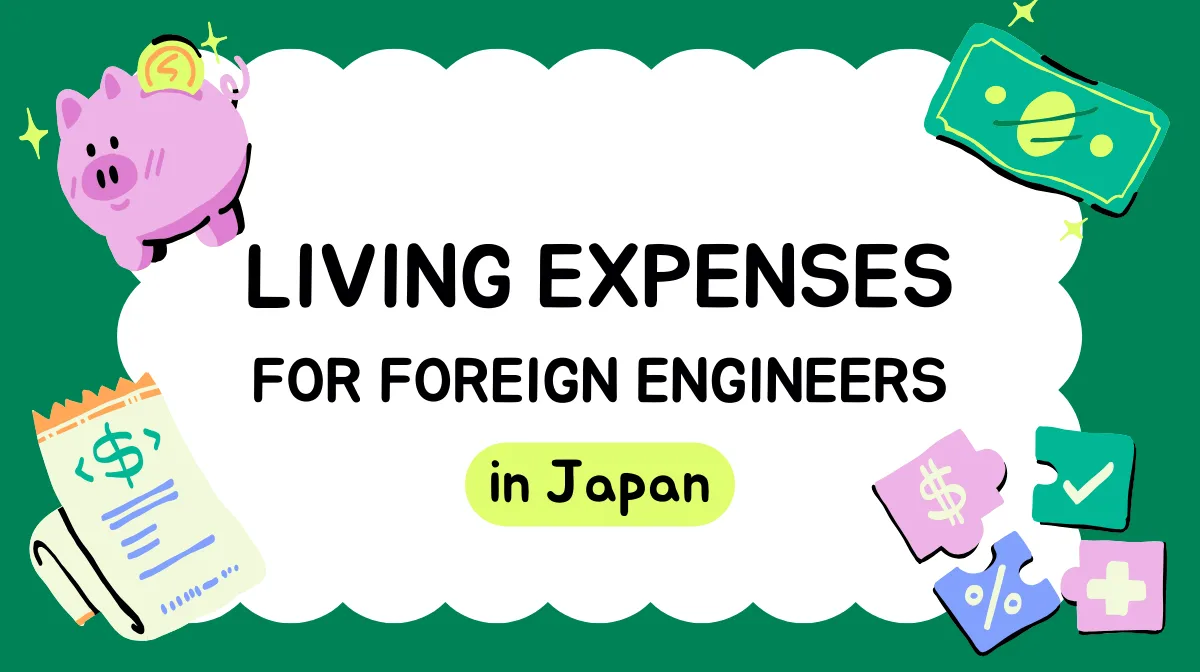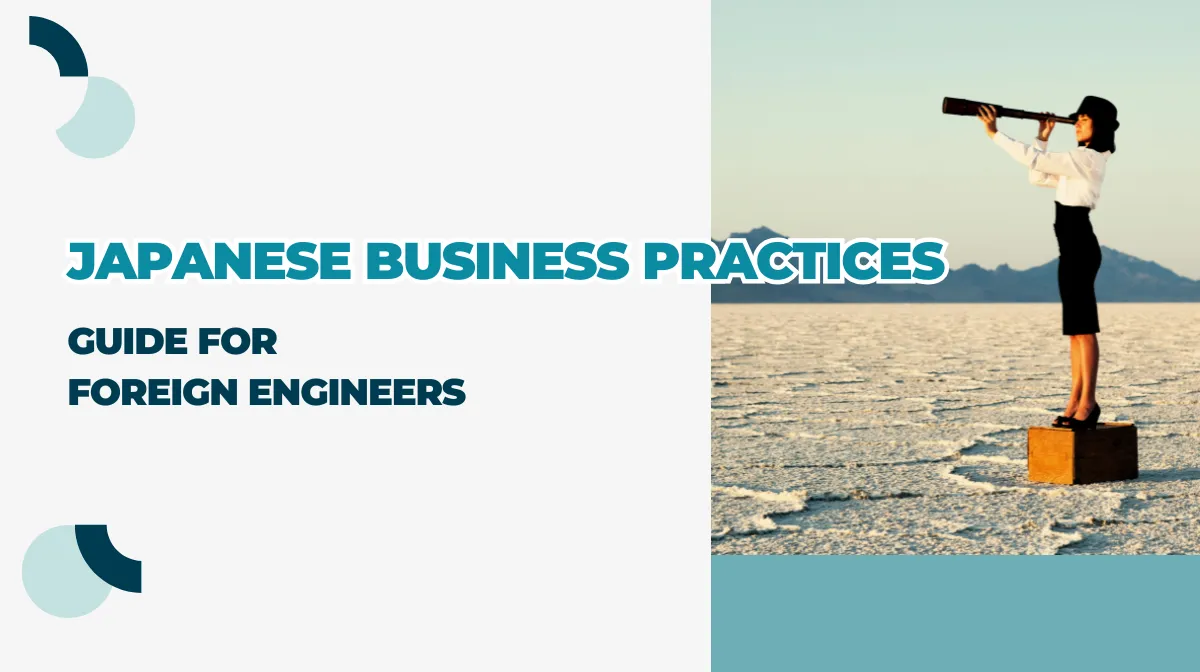Getting a Japan work visa for Russian citizens as an engineer is achievable with proper preparation.
This comprehensive guide covers application strategies that highlight your strengths and provides essential cultural adaptation tips for thriving in Japan’s tech industry, even amid current international circumstances.
- 5-step visa application process for Russian engineers.
- How to use your Russian tech background effectively.
- Key cultural tips for Japanese workplace success.
1. Understanding Japan Work Visa Basics for Russian Citizens

Visa vs. Residence Status
A visa is your entry ticket obtained from Japanese consulates in Russia. Residence status determines your permitted activities in Japan.
Best option for engineers
“Engineer/Specialist in Humanities/International Services” covers programming, system design, and IT work. Advanced engineers may qualify for “Highly Skilled Professional” status with faster permanent residence pathways.
Current situation
Japan processes work visa applications for Russian citizens normally. Individual employment visas remain unaffected by international circumstances, though expect thorough reviews and longer processing times. Approval rates stay consistent with other countries.
2. Why Japanese Companies Value Russian Engineers
Russian engineers bring unique advantages that Japanese tech companies actively seek. Russia’s mandatory computer science education from 6th through 11th grade provides six years of systematic programming exposure before university. Combined with rigorous mathematics training, this creates engineers with exceptional problem-solving abilities.
Educational Excellence
Russian universities blend theoretical knowledge with hands-on projects, producing graduates with immediately applicable skills. This educational approach has resulted in Russian universities dominating the International Collegiate Programming Contest (ICPC) for eight consecutive years since 2012.
Technical Strengths
Japanese companies particularly value Russian engineers for their algorithm mastery and mathematical rigor, especially valuable in AI and machine learning roles. Many Russian engineers are proficient in popular languages like Python, Kotlin, Java, and JavaScript, directly matching Japanese market demands. Their serious work ethics and respect for hierarchy align well with Japanese corporate culture.
■Related Reading
Understanding workplace expectations beyond technical skills is crucial for long-term success in Japanese companies.
■日本でエンジニアとしてキャリアアップしたい方へ
海外エンジニア転職支援サービス『 Bloomtech Career 』にご相談ください。「英語OK」「ビザサポートあり」「高年収企業」など、外国人エンジニア向けの求人を多数掲載。専任のキャリアアドバイザーが、あなたのスキル・希望に合った最適な日本企業をご紹介します。
▼簡単・無料!30秒で登録完了!まずはお気軽にご連絡ください!
Bloomtech Careerに無料相談してみる
3. 5-Step Process for Getting Your Japan Work Visa
Degree, 10+ years of IT experience, or specialized certifications required.
Receive an official employment contract from a Japanese company.
Your employer applies in Japan. Process takes 1-3 months.
Apply at the Japanese consulate in your country. Takes about 1 week.
Get your Residence Card at the airport and register your address.
The visa application follows a clear sequence.
Step 1: Verify Your Qualifications
You need one of the following
- University degree: 4-year degree in information engineering, computer science, mathematics, or related fields
- Work experience alternative: 10+ years of IT experience if you lack the educational background
- Specialized skills: Exceptional technical abilities demonstrated through certifications
Step 2: Secure a Job Offer
You need a concrete employment offer from a Japanese company – an actual employment contract or official job offer detailing your role, salary, and responsibilities.
Step 3: Apply for Certificate of Eligibility
Your prospective employer submits your application to Japan’s Immigration Bureau, including academic credentials, work history, and company documentation. Processing takes 1-3 months, potentially longer during busy periods.
Step 4: Get Your Visa in Russia
Apply for your visa at Japanese consulates in Moscow, St. Petersburg, Vladivostok, Khabarovsk, or Yuzhno-Sakhalinsk. Processing typically takes one week.
Step 5: Complete Entry Procedures
After arriving in Japan, receive your residence card at the airport and register your address within 14 days. Complete essential tasks like health insurance enrollment and opening a bank account.
4. Maximizing Your Application Success as a Russian Engineer
Your Russian background provides significant advantages. Showcase your mathematical and algorithmic expertise through university coursework in algorithm theory, competitive programming achievements like ICPC participation or Codeforces rankings, and specific optimization examples with measurable results.
Explain your educational background clearly since Japanese employers may not understand Russia’s system: “Russia’s mandatory computer science curriculum from 6th grade provided 11 years of systematic programming education. At university, I combined theoretical study with practical development projects, graduating with industry-ready skills.”
Showcasing Technical Skills
Focus on programming languages in high demand in Japan.
- Python: Emphasize machine learning, data analysis, and automation experience
- Java: Highlight enterprise application development
- JavaScript: Show both frontend and backend (Node.js) capabilities
- Kotlin: Demonstrate Android development or modern backend services
Always provide concrete examples: “Using Python and TensorFlow, I developed an image recognition system that improved processing accuracy by 30% while reducing computational time by 45%”
■Related Reading
Learning about Japanese interview culture will help you present your skills effectively during the hiring process.
■日本でエンジニアとしてキャリアアップしたい方へ
海外エンジニア転職支援サービス『 Bloomtech Career 』にご相談ください。「英語OK」「ビザサポートあり」「高年収企業」など、外国人エンジニア向けの求人を多数掲載。専任のキャリアアドバイザーが、あなたのスキル・希望に合った最適な日本企業をご紹介します。
▼簡単・無料!30秒で登録完了!まずはお気軽にご連絡ください!
Bloomtech Careerに無料相談してみる
5. Essential Document Preparation
Proper documentation is crucial for approval. You’ll need academic credentials including graduation certificates and transcripts showing your major, GPA, and relevant coursework. Professional documentation should detail your responsibilities, technologies used, and project outcomes. Letters of recommendation from supervisors add significant value. Your passport must be valid for at least six months.
Translation and Authentication Process
All Russian documents require professional translation through this four-step process
- Certified translation by authorized Russian translators
- Notarization of translations
- Apostille authentication from Russia’s Ministry of Foreign Affairs
- Final authentication at Japanese consulates
Common Preparation Mistakes to Avoid
Ensure document consistency – all paperwork must tell the same story. Clearly explain your educational background since Japanese immigration officers may not understand Russia’s system. Be confident about your technical abilities while remaining appropriately humble. Start document preparation early, as international authentication takes considerable time.
6. Critical Success Factors for Japan Work Visa Applications
Structure your personal statement effectively: clearly state your desire to work in Japan, highlight your Russian technical education, explain specifically why Japan appeals professionally, outline realistic career goals, and describe how you’ll benefit Japanese society and your employer. Avoid focusing solely on salary benefits or making vague cultural statements.
Understanding Common Rejection Reasons
Your degree must clearly relate to intended work – provide detailed explanation if the connection isn’t obvious. New or financially unstable companies face scrutiny, so ensure comprehensive business documentation. Immigration officers compare offered salaries to Japanese market rates, making fair compensation negotiations essential. Inconsistent document information raises red flags – double-check everything for accuracy.
7. Managing Your Japan Work Visa After Arrival
Successfully obtaining your visa is just the beginning of your career journey in Japan.
Renewal and Maintenance
Apply for renewal 3 months before expiration, though completing it one month early is safer. You’ll need current tax documents, employment certificates, and proof of stable income. The renewal period depends on your employment stability and compliance record.
Job Changes
When changing jobs, especially if your new role differs significantly from your current position, apply for a Work Qualification Certificate to confirm your new duties align with your visa category. Always secure new employment before leaving current jobs and minimize unemployment gaps.
Long-term Pathways
Permanent residence requires 10+ years of continuous residence with 5+ years under work status. Key requirements include annual income of 3+ million yen, complete tax payment records, and Japanese language ability at N2 level.
The Highly Skilled Professional visa offers an accelerated path requiring 70+ points based on education, age, salary, and language ability. Russian engineers often score well due to high educational attainment, competitive salaries, and young arrival age.
■Related Reading
Once you’ve secured your visa, understanding the practical aspects of daily life in Japan becomes essential.
8. Navigating Cultural Differences in Japanese Workplaces
Technical skills alone won’t guarantee success. Understanding workplace culture is equally important.
Key Cultural Contrasts
Decision-making
- Russia: Top-down approaches with quick decisions
- Japan: Consensus-building processes taking more time
- Your approach: Participate respectfully, consider others’ viewpoints
Problem-solving
- Russia: Independent work and individual responsibility
- Japan: Team collaboration and information sharing
- Your approach: Consult colleagues when facing challenges
Communication style
- Russia: Direct communication
- Japan: Indirect, softer language with context reading
- Your approach: Express appreciation frequently, learn subtle cues
Mastering Japanese Business Etiquette
Arrive 5 minutes early for meetings, understand deadlines as firm commitments, and consider team situations when planning overtime. Start emails with “Thank you for your hard work,” organize information clearly, and end with polite requests.
Building Successful Team Relationships
Japanese workplaces value collective success over individual achievement. Share technical knowledge through presentations and mentoring, support colleagues’ projects, and participate in team-building activities.
Invest time learning Japanese technical vocabulary and business expressions. While English proficiency is valuable, communicating effectively in Japanese significantly accelerates relationship building and career advancement.
■Related Reading
Mastering business etiquette will significantly improve your professional relationships and career advancement opportunities.
9. Bringing Your Family to Japan
Once your career stabilizes, you can bring family members through different visa types depending on their relationship and intended stay duration.
Dependent Visas
For spouses and unmarried minor children, you’ll need dependent visas. Financial requirements include annual income of 2.5+ million yen for couples, with additional 500,000 yen per child. The process involves applying for a Certificate of Eligibility in Japan, sending it to family in Russia, then having them apply at Japanese consulates.
Short-term Visits
Parents or other relatives can visit for 15-90 days on short-term stay visas, though work activities aren’t permitted. You’ll provide invitation letters, guarantee financial support, and create detailed itineraries. Note that short-term status generally cannot be changed to dependent status from within Japan.
■Related Reading
If you’re planning to bring family members, learn about dependent visa requirements and the application process.
10. Frequently Asked Questions About Japan Work Visa for Russian Citizens

Quick answers to common concerns Russian engineers have about the application process:
Current processing status
Individual work visas continue processing normally with thorough document reviews and longer processing times.
Japanese language requirements
No legal requirement exists, but N3+ level significantly strengthens applications. Basic conversation skills help during interviews.
Experience requirements
Computer science degrees qualify without programming experience. Personal projects and internships strengthen new graduate applications.
Additional work activities
Side jobs and freelancing are possible within visa scope but may require extra permissions. Always secure new employment before changing jobs.
Information sources
Monitor Immigration Services Agency website, Japanese Embassy websites in Russia, and Ministry of Foreign Affairs advisories. Consult licensed immigration lawyers for complex situations.
11. Japan Work Visa for Russian Citizens
Securing a Japan work visa for Russian citizens as an engineer is highly achievable through proper preparation and leveraging your unique educational strengths.
Follow the structured 5-step application process, prepare comprehensive documentation with proper authentication, and clearly demonstrate how your Russian technical background creates value for Japanese employers. Success depends on combining your algorithmic expertise with cultural adaptation and genuine commitment to working in Japan’s advanced technology market.





















